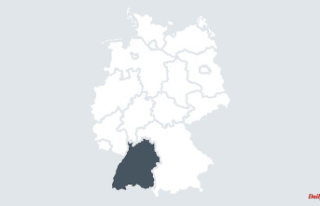In several places in MV, new accommodations for several hundred asylum seekers are causing displeasure. The Ludwigslust-Parchim district council meeting is about 90 apartments that the district rents in the 860-inhabitant municipality of Demen.
Parchim (dpa / mv) - The district administrator of the district of Ludwigslust-Parchim, Stefan Sternberg (SPD), has defended the planned accommodation of several hundred asylum seekers in the municipality of Demen. No container village or tent city will be built, but 90 existing apartments will be rented, he said on Thursday in the district council. Rental starts on April 1st. The apartments are currently being renovated.
At the same time, Sternberg appealed to the federal government to provide more support for social infrastructure such as medical care, daycare centers and schools, because Mecklenburg-Western Pomerania is characterized by small communities. "We'll be able to tolerate another sustained influx of this kind for a while, but we're also at our pain threshold," he said.
In a letter, all six districts asked Prime Minister Manuela Schwesig (SPD) and Interior Minister Christian level (SPD) to address the issue at the next federal-state summit. "There must be solutions from the federal government," Sternberg clarified.
New, large accommodations for asylum seekers are currently being prepared in several places in MV, which is causing dissatisfaction locally, for example in Upahl (Northwest Mecklenburg) and Greifswald. The municipalities have hardly any free capacities due to the large number of refugees from Ukraine.
Before the district council meeting in Parchim, around 50 people demonstrated peacefully in front of the building for the reception and integration of refugees and asylum seekers. In the residents' question time, a citizen from Demen criticized the decision to accommodate several hundred people in the place. There is nothing there for the people, he said. The Demeners asked for more information, he said. Other residents asked Sternberg to come to Demen and answer the residents' questions.
According to Sternberg, families should be accommodated in the apartments in Demen. Although 455 places are planned, an accommodation is already considered to be occupied with an occupancy of 75 percent. The 90 apartments are located in two blocks of flats that were built for the National People's Army in GDR times. A barracks area once stretched behind it. According to its own website, the municipality of Demen has around 860 inhabitants. Sternberg assured that the apartments would only be gradually occupied.
The district administrator also said that social care and a security service were planned for the accommodation for asylum seekers in Demen. Language courses should be organized in cooperation with the adult education center. In addition, childcare is offered in the buildings, since the day care center in the village is busy. Foreigners and social authorities would set up office hours on site. Medical care is provided in cooperation with the Crivitz hospital, as the doctor on site is busy.












